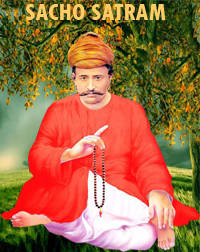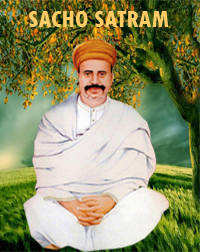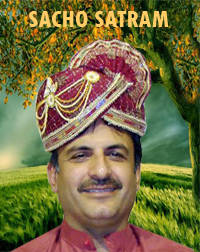The Precious Gift of Life and the Path to Spiritual Growth.
Saijan explained that those who have given us this life have every right over it. They nurtured us, provided us with a respectable identity, educated us, and supported us through our formative years. Unfortunately, not all children receive this privilege—many are abandoned or placed in orphanages, deprived of even the recognition of their parents’ names.
Therefore, those who are fortunate to receive love, care, and guidance must always remember the sacrifices of their parents, who often set aside their own needs for their children’s well-being. Life is not meant to be lived solely for personal desires while disregarding the responsibilities that come with it. Thinking that our life belongs only to us, with no accountability to anyone, is a misconception.
We did not come into this world by our own will. It was by our parents’ decision, supported by God’s blessings, that we received this life. Thus, those who gave us life have every right over it, and assuming otherwise is mistaken.
Saijan further explained that if we observe closely, we never tell other life forms to behave according to their nature. We do not instruct a lion to act like a lion or a cuckoo to sing like a cuckoo. Birds and animals naturally follow their instincts. However, humans are often reminded to “behave like a human”—especially when they engage in wrongdoing, mistreat others, or exploit people.
Hazir Swaroop Sai Sadhram Saheb said that we celebrate the birth anniversaries and other programs of great Saints, Mahapurushas, Devis, and Devtas to draw inspiration from their righteousness, honesty, and spiritual journey.
When we reflect on the life of Shahanshah Satguru Swami Sai Satramdas Saheb, we see that his words carried immense power—whatever he spoke became reality. His level of self-discipline and self-control was beyond imagination. A profound example of his extraordinary self-mastery is seen in a moment of immense personal loss—when his beloved son passed away due to someone’s actions, he did not curse that person. Instead, he blessed him, praying that his desire be fulfilled.
In contrast, we often react strongly even when someone merely speaks ill of our children, sometimes without verifying the truth. Yet, despite losing his son, Shahanshah Satguru chose forgiveness over anger. This was possible because of the immense spiritual strength he had cultivated through unwavering devotion, steadfast Nem, deep Dhyan and Simran, and an unshakable trust in Parmatma.
From Sai’s life, we learn the importance of walking through life with awareness and nurturing it with wisdom.
Humans have the unique ability to correct themselves by using their God-given intellect and wisdom.
We have no right to waste or diminish the value of our life by engaging in inappropriate actions. Instead, we should cherish and uphold both our life and the purpose of our birth by seeking refuge in our Satguru and dedicating ourselves to meditation, Simran, and Nem.
Human life is not meant to be lived in isolation or selfishly. We must honor those who are part of our journey—our parents, relatives, friends, and all those who have supported us. We are all interconnected, and everything around us plays a vital role in our existence.
Therefore, we should always nurture and value our life and use it meaningfully.
Hazir Swaroop Sai Sadhram Saheb said that those who dedicate themselves to selfless seva and immerse in Nem, Dhyan, and Simran free themselves from jealousy, hatred, and anger. Even a strong ego dissolves when one engages wholeheartedly in seva.
We must always remember that this life has been given to us by someone—it is not solely ours. It is a result of divine grace and the love of those who brought us into this world. Gratitude and awareness should guide us to make the right use of our life by engaging in selfless Seva, Dhyan, and Simran.



